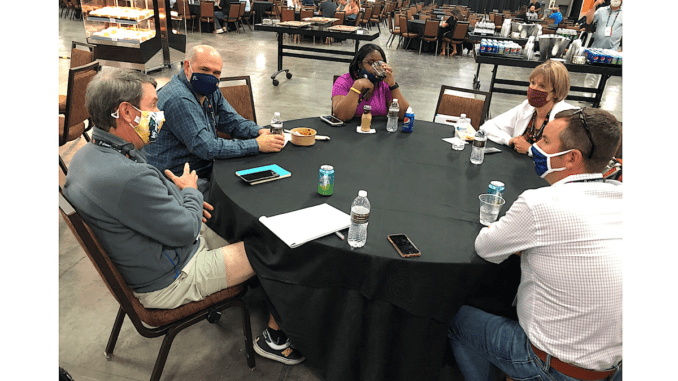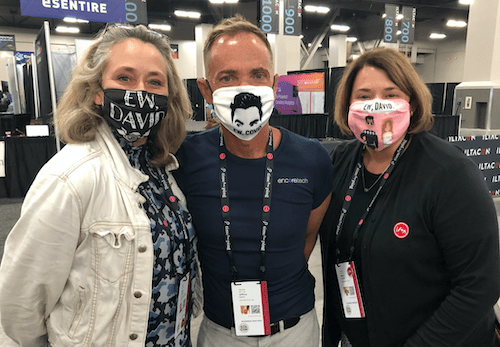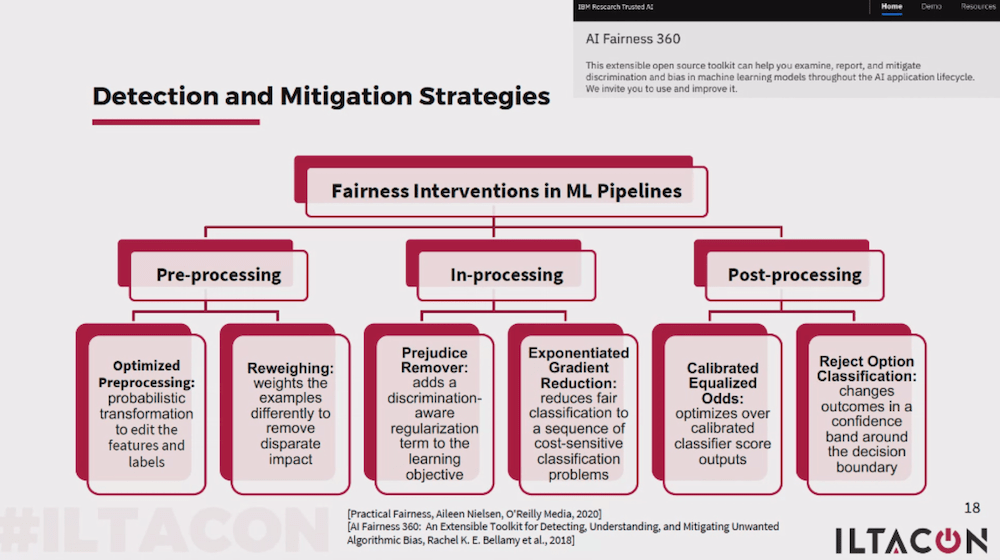
Artificial Lawyer Special Correspondent, TJ Johnson, AVP, Legal Sector Strategist at Qualitest, reports from Las Vegas on ILTACON Day 3, and especially on what legal tech experts see as their main challenges now and those to come.
I sat down at a lunch table and participated in some really interesting discussions today. It was totally energising. This is the value ILTA provides in addition to the education, the networking, and the sharing of stories.
My tablemates were: Karen Norman, IT Director at Downs Rachlin Martin; Sean Luman, Director of Knowledge Management; Damian Burdette, CIO at Kean Miller; LaToya Deese-Richardson, IT Specialist at Bracewell; and Scott Christensen, VP at Qualitest (pictured above).
They started with a few thoughts on ILTACON 2021, agreeing that the conference provides the moral support to shore them up for the next year.
Damian noted that we all battle the same challenges, regardless of firm size, so it really doesn’t matter who you sit next to in a session or at lunch, you are speaking the same language and easily share challenges and successes.
The biggest thing is to rekindle and start new peer relationships. Sean also talked about the product demos that it was so nice to be able to do in person for the first time in 18 months.
Here are a few of the topics we discussed. It was a bit chaotic, as conversations among peers can be:
- COVID hurt the forward progress that many law firms were making, with reduced budgets and just getting people working well in the remote world. Now they are feeling behind and wondering if it will ever be like it was, or at least catch back up.
- There were manual processes that had to be reworked, automated and or replaced with whole new processes during the pandemic. There is a concern there will be pressure to revert back to the old ways when more people are back in the office.
- IT leaders who are working through 365 rollouts and figuring out how to use MD Teams to best advantage in law firms, they are looking for those at ILTACON who have already made the transition, to share their experiences.
- There are so many lingering questions about the best technologies and the right IT staffing model to support a hybrid workforce long term – do we need physical phone sets anymore, should all our systems be moved to the cloud…?
- There’s a lot of uncertainty and mystery around how to budget for 2022.
- So many bad security practices to manage with a remote workforce still.
- Setting a good cadence for technology changes and updates is such a challenge, hard to balance the need to disrupt the workflow for lawyers as little as possible.
- We also talked about whether continuous change is easier to tolerate for lawyers than a few massive technology changes.
I asked the group which ILTACON educational session they enjoyed the most so far (only 25 sessions out of 60 have taken place by the end of today). The session on Security Worst Practices got rave reviews and the Change Fatigue session also, (more on that in a bit).
Day Three – Education
There were lots of great sessions today, starting with the Keynote: Talent Development in a Hybrid Work Environment. Gina Buser, CEO of Traveling Coaches facilitated the discussion with Desirée Moore, Partner and Director of Professional Development of K&L Gates and Elizabeth (Betsy) Nelson, Real Estate Counsel and Adjunct Law School Professor.
They covered the complex challenges created by the shift to working from home, then to hybrid in/out of the office models – e.g. onboarding and acclimating new hires; providing disparate work teams with opportunities to connect, collaborating and creating a community; and mentoring new associates.
In the end it all comes down to making meaningful connections, was the conclusion.
The Change Fatigue Session
‘Ewww, David! Change Management and User Group lessons learned from The Roses’.
This talk involved: Susan Sommers, Director, KM Innovation & Solutions at Ogletree, Deakins, Nash, Smoak & Stewart; Tim Fox, Director, Practice Intelligence and Analytics at Ogletree, Deakins, Nash, Smoak & Stewart; Samuel Whitman, Global Assistant Director of Innovation at Mayer Brown; Jeffrey Roach, Partner at Encoretech; and Marti Phillips, Director of Learning and Development at Encoretech.

I asked Susan about the session. She said: ‘Not only has the pace of change in law firms accelerated as a result of internal projects and client pressure, but I would argue that every person supporting the firm should have a framework for change to be able to keep up with the pace and needs of our users. Change isn’t limited to projects, it is foundational to how we collaborate with each other.
‘And because change relies on behaviour change and people, it’s important to share everyday tactics and tools to help teams and individuals move forward.’
I attended another very interesting, if somewhat technical session, this afternoon: ‘The Letters AI are in FAIR, But is Artificial Intelligence Fair?’ AI solutions, especially those developed with machine learning, are at high risk for grabbing and blindly reproducing biases present in the data leveraged by the solution, the panel explained.

The speakers covered ethical considerations of AI, specific to the legal industry, the basic theory of bias introduction, identification, and mitigation along with a discussion of real-world examples. They then walked through a detailed interactive example with a real dataset. It was fascinating to hear how many types of data bias can affect AI results as well as how they can be detected and mitigated.
The speakers were: Alec Lovlein, Data Scientist at Orrick, Herrington & Sutcliffe LLP; Corey Ouellette, Lead, Toronto Labs Customer Centre at Thomson Reuters; Dawn Sepehr, Research Scientist at Thomson Reuters; Dhivya Chinnappa, Research Scientist at Thomson Reuters; and John Hudzina, Lead Research Scientist at Thomson Reuters.
[ P.S. AL Editorial note: of course, when we are talking about bias, all processes and decision systems based on past data will have biases in them, the question is whether we see them and if we accept them or not, (and you might say that the biases that are lawful and/or socially acceptable are the biases we don’t tend to see – and naturally that can also work the other way around depending on the scenario). Plus, most tools used by commercial lawyers will not get into forms of bias that relate, for example, to employment law issues. An NLP tool used for finding change of control clauses utilised by a global law firm in M&A deals, or one for doing legal research into commercial case law, are a long way in terms of any ethical concerns from a tool used by a corporate to sort through and automatically reject job applications based on the prior employee data collected by that business.
Then we have the more mundane biases that are not really ethical, but also matter, e.g. a doc review sample is skewed toward a certain set of company documents and ignores other key contracts, thereby giving an unrealistic picture of the company. This is more about a good understanding of statistics and the need for a broad and balanced data set.
So, we have to be a bit wary when using the term ‘bias’ and be clear how we are using it and in what business, data analysis, or legal context, but worth understanding for sure.]
–
Thanks again to TJ at Qualitest for the great report and photos from ILTACON.